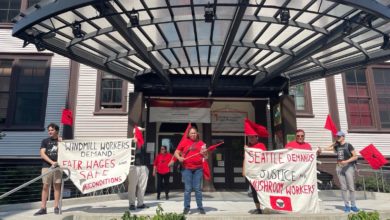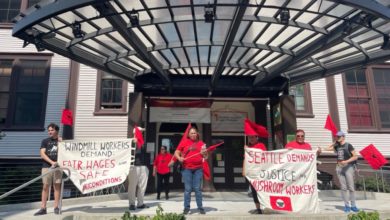The Seattle City Council dealt a bitter blow to unhoused Seattleites and their allies on June 12, voting 7-2 to repeal the Employee Hours Tax less than a month after it was initially passed. While the initial tax was the culmination of a process of deliberation and discussion ranging over a period of months.This stunning reversal came at a special session of the City Council held less than 24 hours after it was announced to the public.
Activists had pushed for a progressive tax on the biggest businesses in Seattle, including tech giants like Amazon and Facebook, as well as local heavyweights like Dick’s Drive In and Uwajimaya. In its original form, the proposed tax would have collected approximately $500 a year per employee from businesses with over $20 million in gross annual revenue, which would contribute an additional $75 million to the budget, more than tripling the existing $34 million budget for housing services in Seattle.
The tax that was adopted by the city council on May 14 was a watered-down version of that proposal that was expected to garner $47 million a year, and which would expire in five years if not renewed. That money would have meant additional funding for shelters and other temporary solutions as well as for the much needed affordable housing that will need to be constructed in order to have a meaningful long term impact on the problem.
As soon as the tax was adopted, money began to flow into the coffers of opposition groups pushing a ballot initiative making a repeal of the EHT an item on the November ballot. While this would have been a step back that would result in the continuation of preventable suffering, it would still have allowed a period of roughly four months in which to engage with the public in a thorough and fact-based examination of the issue in detail before a vote took place.
The Seattle City Council intervened as soon as it was made clear that the referendum initiative had gathered the necessary signatures. The City Council held a special meeting on less than 24 hours’ notice and without any apparent intention of soliciting public comment at all. This was done explicitly in order to avoid a struggle which, as Council member Lisa Herbold pointedly remarked, “Is an un-winnable fight.”
Council member Lorena Gonzalez gave voice to the spirit of capitulation and abject surrender to big business that characterized the proceedings by solemnly declaring, “We can’t out-fundraise the competition.” This is a point-blank admission of the reality of power under capitalism, that the legal and governing institutions do no serve the people. Rather, they serve the capitalist class that created and controls those institutions.
By striking this extremely modest and already heavily compromised tax, the Seattle City Council sent a message that the needs of big business will always come before the needs of the people. No concessions, no matter how small or reasonable, will be considered so long as they conflict with the interests of the capitalist class.
It is nothing short of class warfare when the richest person in the world chooses to fund anti-tax groups in an effort to avoid helping the unhoused working class people that they have helped to displace. The array of businesses that have come out screaming for a repeal shows that this reaction is not limited to Jeff Bezos, or even to Amazon. It is a pushback by the capitalist class against a tax that makes the link between big business, skyrocketing housing costs and the record number of people experiencing homelessness explicit. It could not be allowed to stand, because granting legitimacy to a tax on major businesses would amount to an admission of responsibility on the part of the those businesses. It is also being watched carefully by the rest of the country as other cities consider similar taxes, raising the stakes for this struggle in Seattle even higher.
The need for a total system change is made painfully clear by this defeat. In spite of mobilizing hundreds of activists in over a period of months, and in spite of the 12 different City Council meetings held to discuss the housing crisis and potential solutions, the process was eventually subverted entirely. Even after an independent report commissioned by the Seattle Chamber of Commerce determined that far more would be required to meaningfully address the problem, the City Council still chose to abandon the most vulnerable among us when it became clear that the ruling class would not tolerate the EHT. This is not merely the result of a personal failing on the part of the City Council members who voted to repeal the tax, but rather a clear example of the system serving the class that it was built to serve.
To be able to gain and retain the sorts of advances that working people really need, a system must be built that is a government by and for the working class. Capitalism will never give us the kind of results that would make a difference in our lives without a bitter struggle, and even then it is always possible to take those gains back, as this struggle has shown. Only socialism can bring the sort of meaningful and lasting changes that can finally eliminate poverty and homelessness.






